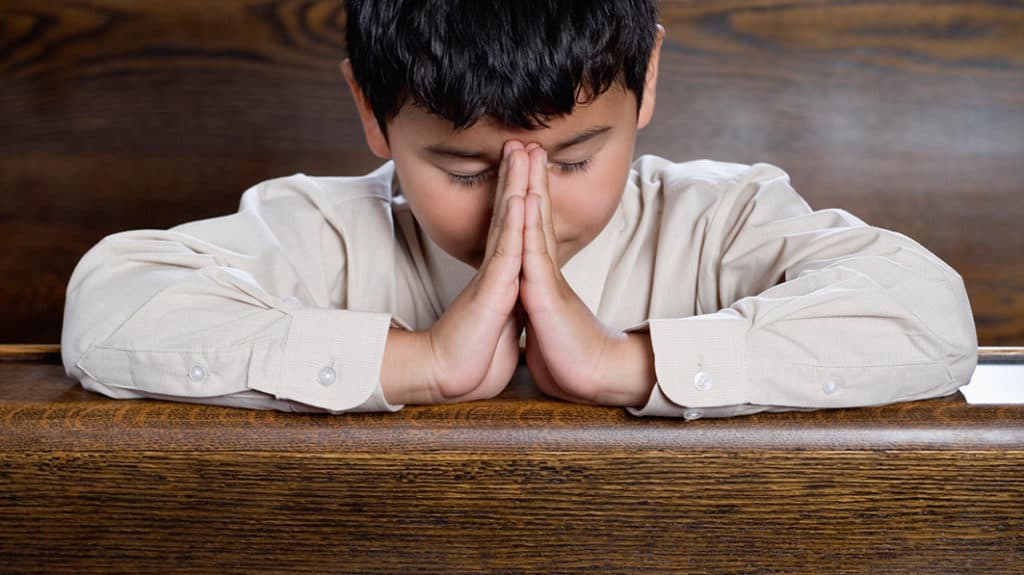
Fun Ways for Your Family to Practice Praise
Practice praising God as a family, and it will change the way you deal with circumstances and lighten the atmosphere in your home.

Sometimes kids should remain with adults during church so they can experience the true heart of worship.
Parenting kids in the pew on Sunday morning isn’t for the faint of heart. Kids are fidgety, distracting and sometimes downright embarrassing. Just ask the parents of the 2-year-old girl who pointed to a picture of Christ and loudly declared, “Jesus has his pajam-jams on!” Or the mom of the 3-year-old who had been given two quarters for his offering; when told to produce the coins, the boy spit them from his mouth into the offering bag. It’s no wonder so many churches have created separate worship spaces for kids and adults.
But I believe parents who choose to keep their kids in the pew with them on Sunday morning have an opportunity to experience the true heart of worship. I actually learned to worship through the effort of teaching my two squirming boys how to worship!
Worship is our offering to God — a living sacrifice, holy and pleasing to God (Romans 12:1). Worship is all about God, not us. It is about God’s pleasure, not our performance. It is about God’s glory, not our growth. Helping my kids engage in worship was a sacrifice of my personal enjoyment and convenience on Sunday morning. But in sacrificing my “what I get out of it” attitude, I learned how to pay attention to what God wanted.
It was hard work to think through how I could train my children to worship. I didn’t want them to just be quiet and behave on Sunday morning — I wanted them to belong. I didn’t want them to entertain themselves, but to engage with God in the wonder of what worship really is. Eventually, I discovered practical ways to help my boys fully participate in every part of our service, from the singing of praise songs to the listening of God’s Word. Try the following tips to see what works for your family.
Most kids love “the singing part” of the service because they can make a joyful noise as well as anyone. If there is a short refrain, help younger children sing that part with gusto! Toddlers can sing the longer verses with “la-la-la.” If it’s OK with your pastor, let your kids stand on the pew or chairs so they can feel more included and see what’s going on. Just keep an arm around them so they won’t fall.
Grade-school kids will sing more of the song as they learn to read. Kids in early elementary should have the printed words in front of them to follow along. It’s difficult for children under age 11 to focus well on texts at a distance, such as an overhead projection. So, even if the congregation uses overhead lyrics for singing, ask your pastor or worship leader if he or she would be willing to have the lyrics printed on paper for the younger children.
Helping children engage in the times of prayer is also important. I can’t tell you how many times during the “silent prayer of confession” I leaned over to each of my sons and said, “OK, now’s the time to tell Jesus just what you did this week concerning that fight with your brother.” I also let the boys know, as they listened to the declaration of forgiveness, that all of it was “over and done with — yahoo!”
Let your children know it’s OK for them to pray during times of group prayer. For many congregations, prayer expressions are limited to a word, a name, a phrase or a sentence, and children can easily join in with their own concerns, the name of a sick friend or an expression of thanks. Sometimes these prayers will be funny, but often they will be poignant and honest. The unfiltered prayers of children can help a congregation pray more thoughtfully.
One thing children can prepare ahead of time is their tithe or offering. Let young children decorate small envelopes with a picture for Jesus. (Did you know Jesus likes pictures of sharks from 6-year-old boys and rainbows and flowers from 4-year-old girls?)
If toddlers earn $1 a week putting toys in a toy box every night, pay them in dimes and show them how to give Jesus the shiniest dime to present in their decorated envelope. What a difference on Sunday morning when the plate is coming your way! Not only are your children excited about giving, but they also are giving something of their own.
Helping train children to listen during the “long part” (the sermon) is a challenge. Get advance notice of the sermon topic or scriptural exposition and think of a word (or ask your pastor for a word) that will be repeated throughout the sermon. Ask toddlers to squeeze your finger every time they hear that word. It’s just a beginning, but it helps. Ask grade-school children to listen for a repetitive idea and to retell an illustration after the service.
Training children to worship the Lord and participate as part of the community of faith takes persistence, patience and prayer. Think through your Sunday morning rhythm and ask, What can I do to help my children participate in each part of the service? And don’t let the awkward or embarrassing moments dampen your resolve. To see God begin to work wonders in your child is the deepest joy of parenting.
Robbie Castleman is a professor of theology at John Brown University and the author of Parenting in the Pew.